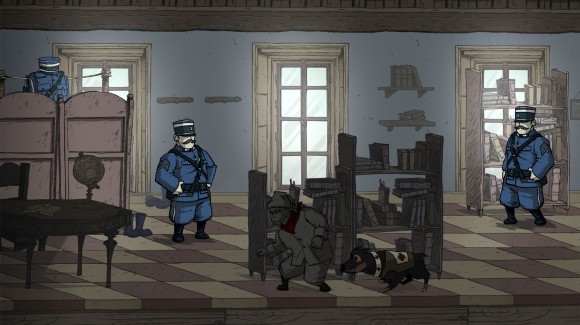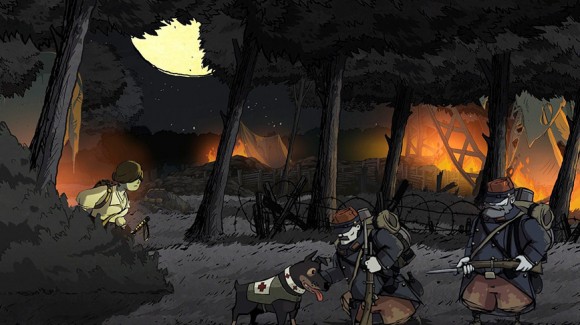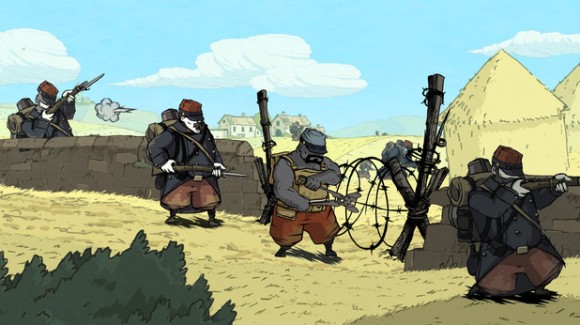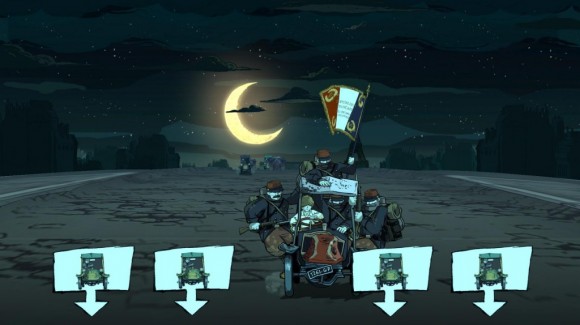World War II was a strange war that made it particularly palatable for entertainment related consumption. It seems like it’s the war that’s always on our minds for obvious reasons. It had a side that was clearly evil, global reach, intrigue, desperate gambits, and game changing super weapons. Students of history, however, could argue that its older sister, World War I (or the Great War), was a more important historical occurrence. It served simultaneously as the final exclamation mark of the era European Colonialism, and the beginning of the modern era. It is also a much less satisfying war to portray. It was a war in which defensive technology greatly outperformed offensive capabilities, fought by soldiers who didn’t particularly care or even know what they were fighting and dying for. The Great War was the result of a complex system of alliances that ended in a clash where both sides suffered horribly and there were no real culprits (unless you want to blame Serbia and Bosnia). And so World War I has gone underutilized by games as a setting in favor of its younger, less complex sister. Valiant Hearts works as a way to address both of those issues. It is a game set during the Great War that aims not only to entertain, but to educate. It is also a rare war game where you will never pick up a rifle.
Valiant Hearts is an adventure game that also falls into that strange category referred to as “edutainment”. It aims not only to entertain, but also to educate about the often ignored conflict. The educational side is achieved via pages in the menu that come up as the game progresses, or certain hidden collectibles are picked up. Think of it as the codex with lore and back story from Bio-Ware RPG’s Depending on how much you know about the events of the Great War, they might be interesting. They also do provide some context to what is going on as the characters arrive at a specific event or place in story. Ubisoft was wise enough to make this as unobtrusive as possible. It is possible to go the whole game without looking at one of these sections, so for those who are history buffs and don’t need the background, or those who just don’t care, the education aspect is easy to avoid. Still, it is a good way to illustrate why its important that the characters are in Ypres, for example.
World War I was a global conflict, but Valiant Hearts focuses on the Western Front, the line drawn between Germany and France where much of the iconic trench warfare took place. There is a good reason for this, Valiant Hearts is not really the type of war game we’ve come to expect in a post Call of Duty world. The narrative focuses on people, rather than on the conflict. The war is more the back ground, a machine hungry for lives and resources around which the whole game takes place. The narrative focuses on four major characters: Karl, Emile, Freddy, and Anna. Karl is a German living in France who finds himself deported and conscripted into the German army. Karl leaves behind a wife, child and father in law named Emile. Emile winds up getting drafted into the French army. Freddy is an American volunteer in the French army, who is pursuing a personal agenda. Anna is a Belgian veterinarian looking for her father while accompanied by Walt, an awesome dog.
To get into the stories in any detail would count as a spoiler, but in essence Valiant Hearts is more personal than most games. The first part of the game happens during the early days of the war, and it feels more like a thriller in the style of Tin Tin than a war story. The second half, however, becomes much more somber as we settle into scenes containing trenches and chemical warfare, and the true nature of the war is revealed.
The story is mostly told via letters that the characters write to each other, and by narration. There is dialogue in the game, but it is minimal and consists of only a few phrases in French, German or English (depending on the character). The game has a cartoonish art style that is reminiscent of European comics. It is very colorful, and along with the music it gives it a whimsical tone that makes it all the more painful when bad things do happen. And boy does Valiant Hearts do a great job of showing just how horrible trench warfare could get. The contrast between the lighthearted early game and the darkness of its closing chapters heightens the impact in ways that I feel games that have a consistently grim tone are simply unable to do.
The game play can be split into three different types of segments. There are adventure game segments, where you solve puzzles to advance, vehicle segments take the form of a rhythm game where you dodge attacks and obstacles to the tune of classical music, and finally there are battle segments which will have you dodging artillery fire, and often taking on bosses. There is combat, but players will never actually find themselves wielding a firearm. Instead, the combat happens mostly through elaborate puzzles. This is not to say there is no urgency in the game. Some sections will allow you to take your time, but in many occasions, time will be of the essence, making for surprisingly intense and even frantic game play.
I am perfectly aware that Valiant Hearts: The Great War is not for everyone. Those looking for a more traditional war game would be better served pretty much anywhere else. Those who are fans of adventure games, or who are looking for a game with a great narrative will love it. The combination of its presentation, personal stories, and unique setting makes for a rare experience that I am surprised came from a company like Ubisoft. It is a game that does everything that it sets out to do extremely well, and definitely worth the $14.99 it costs as of this writing. If all else fails, you do get to pet the dog on command, you know that alone is worth the price of admission.










